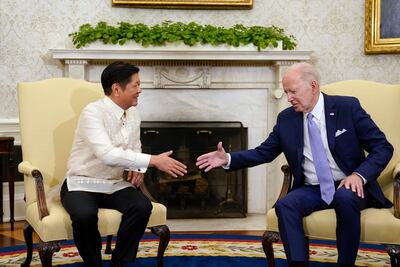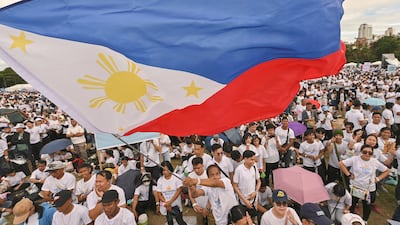A feud festering between Philippine President Ferdinand Marcos Jr and the Duterte family – namely Vice President Sara Duterte and her father, former president Rodrigo Duterte – is no ordinary power struggle. In many ways, it is also the manifestation of a brewing new “Cold War” between China and the US. Time and again, the Dutertes have been Beijing’s most influential allies in the Philippines as well as leading critics of Manila’s expanding defence ties with Washington under Mr Marcos Jr.
Unsurprisingly, the current administration’s first major decision this year was to publicise its removal of Ms Duterte from the country’s National Security Council. And the coming months will probably witness an even more intense showdown, as the Philippines heads to a general election and prepares to deal with a second Donald Trump administration in the US, which is widely expected to take a hawkish stance on China.
Throughout the Philippines’ colourful history, and its long list of celebrity politicians and vivacious presidents, there has been nothing quite like the Dutertes. Throughout his six years in office, the swashbuckling and often foul-mouthed Mr Duterte upended the South-East Asian nation on a number of levels, most notably in foreign policy.

As president, he simultaneously sought to avoid a regional war and radically re-orient his country’s relations with the global superpowers. Although he fell short of severing the country’s century-old military alliance with Washington, Mr Duterte downgraded bilateral naval exercises, suspended the US-Philippine Visiting Forces Agreement and refused to visit any western capital while in office.
Meanwhile, he welcomed large-scale infrastructure investments and loans from Beijing and became the first Filipino president to seek military partnerships with both China and Russia. He once said Russian President Vladimir Putin was his “favourite hero” and described the leadership in Beijing as his ultimate “protector” against what he called nefarious western interference.
His geopolitical gamble, however, had mixed results. China fell short of delivering on its large-scale investment promises, while the US managed to retain its military presence on Philippine soil.
Yet for his supporters, Mr Duterte resembled Turkish President Recep Tayyip Erdogan: a leader effectively positioning his country as a “pivot state” with robust ties to both western and eastern powers. At the very least, Mr Duterte, who enjoyed good relations with both Mr Trump and Chinese President Xi Jinping, proved that the Philippines has significant room for strategic manoeuvre.
For his critics, though, he was more of a “Manchurian Candidate”, namely Beijing’s ally in a nation historically aligned to Washington.
Eager to solicit Mr Duterte’s support for his presidential bid, Mr Marcos Jr initially positioned himself as his natural successor, including on foreign policy issues. He praised Mr Duterte’s pragmatism, questioned the utility of the Philippines’ alliance with the US and downplayed maritime disputes with Beijing in the South China Sea.
But shortly after winning office, he began to sing to a different tune by taking an uncompromising stance on maritime disputes with Beijing and welcoming revitalised strategic ties with the West. Partly, Mr Marcos Jr was responding to latent public distrust towards China as well as the Philippine defence establishment’s largely pro-western orientation.
The decisive factor was Beijing’s inability to honour its large-scale infrastructure investment pledges, coupled with Chinese maritime forces’ continued intimidation of Philippine Navy vessels and fishermen in contested waters. In response, Mr Marcos Jr persisted with his country’s defence co-operation with not only the US, but also Australia, Japan, Germany, France, Britain and New Zealand.
The first major sign of rupture in the Duterte-Marcos alliance was Mr Duterte’s open criticism of his successor’s foreign policy and his own unprecedented decision to meet top Chinese leaders in Beijing without co-ordinating with Manila.
Meanwhile, Ms Duterte refused to publicly back Mr Marcos Jr’s foreign policy position even though she had served in his cabinet until mid-2024 and, crucially, was a member of key agencies such as the National Security Council and the elaborately titled National Task Force to End Local Communist Armed Conflict. So just as the administration of US President Joe Biden fully embraced Mr Marcos Jr as a key ally, Chinese leaders continued to cultivate their ties with the Dutertes.
With both political families enjoying superpower backing, they have felt confident enough to engage in direct conflict with one another.
The Dutertes have shown the audacity to publicly threaten the President (Ms Duterte spoke about “killing him” in a profanity-laced news conference last year); call for the separation of their home island of Mindanao from the rest of the country; and, together with their allies, agitate for protests and even a military coup to topple the government. For his part, Mr Marcos Jr has steadily purged his rivals from all key decision-making bodies, with Ms Duterte now facing the threat of impeachment and criminal charges for her comments against him.
The coming weeks and months will probably get bumpier. Ahead of a legislative election in May, both sides have escalated attacks on each other. The Dutertes have called the governing coalition “corrupt American stooges”, while the Marcos camp has alleged that its rivals are “serving as China’s fifth column”.
The second Trump administration will probably further intensify this feud. Even though Mr Trump’s own strategic calculus is largely indecipherable, his national security team is filled with China hawks, particularly Marco Rubio, the incoming secretary of state, and Elbridge Colby, the presumptive undersecretary for policy at the Department of Defence.
Mr Rubio has made it clear that the Philippines is central to the US’s “ability to maintain great power status”, and Mr Colby has called for more direct Philippines-US military co-operation against China.
Accordingly, top Trump officials will probably nudge frontline allies such as the Philippines to take a more uncompromising stance in the South China Sea and get more involved in helping the US to deter any moves on the nearby self-governing island of Taiwan, which China claims as its territory. Washington is also likely to encourage Manila to roll back Chinese investments and crack down on pro-China elements in the Philippines in the name of countering malign foreign interference.
In response, the Dutertes are almost certain to step up efforts at undermining the expanding security co-operation with the US. Expect them to organise rallies with likeminded civil society groups, launch disinformation campaigns and continue to exhort the Philippine armed forces.
The upshot will be an even more intense and geopolitically consequential showdown between the two most powerful dynasties in the Philippines, with major ramifications for the future of great-power rivalry in Asia.


